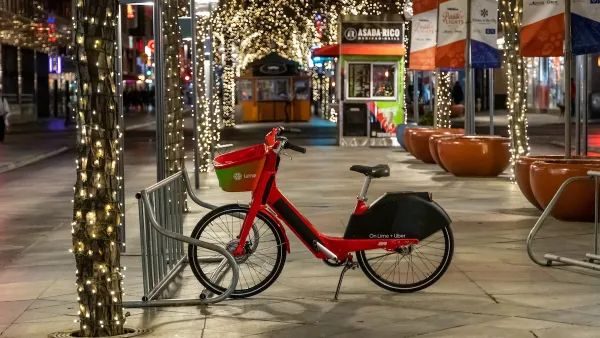The bike helmet requirement will ultimately destroy the success of the planned Seattle bike share program, writes Danny Westneat, Seattle Times staff columnist, after experiencing first-hand the world's most successful bike share program in Paris.

"I just got back from a trip to Paris, and outside of Amsterdam or maybe a major Asian city, I have never seen so many bicyclists in my life", writes Westneat, adding, "Most pleasantly, they're not the Lycra-wearing variety".
Of course, Westneat is not the first to write about the success of the Parisian bike share program, Vélib, the world's largest and first, commencing in 2007.
“A few years ago it was unimaginable that suited businessmen or elegantly dressed women would mount a bike,” reports the magazine Spiegel, on Paris’ two-wheeled cultural sea change. [June 25, 2012].
But Westneat also returned truly troubled, because he thinks that Seattle's bike share program called Puget Sound Bike Share, set to launch in the spring of 2014, will be severely handicapped, and he's not referring to "our rain and brutal hills". No, he adds, "It's our nanny-state helmet law".
Now, for the record, "there is no state law requiring helmet use. However, some cities and counties do require helmet use with bicycles", states the WSDOT webpage. It goes on to list locations where the requirement exists and when the laws were enacted. King County is included.
Bob Anderton of Anderton Law Office writes in his Washington Bike Law webpage on helmets:
According to the King County Board of Health, if every cyclist wore a helmet, the county could save nearly $10 million a year in direct and indirect costs for head injuries.
Bicyclists are required to wear helmets in King County, but the actual law is harder to find than some questionable tax loopholes.
According to Westneat, helmetless cyclists in Seattle face a $103 fine.
Back to Paris. Westneat writes, "When I asked why no cyclists outside the Tour de France seemed to wear headgear, a bike-tour leader answered with a single French word: “Liberté!”
Even the bike-share program in Paris is called “Vélib,” for “vélo” and “liberté.” In other words: bike freedom.
Westneat is firmly in the camp that Seattle's helmet law has got to go.
(A)s the French say: Il faut bien vivre. You gotta live.
Elizabeth Rosenthal, a reporter and blogger on environmental issues for The New York Times wrote about the potential conflict between mandatory helmet laws and bike sharing in her Sept. 2012 news analysis that includes Vélib, accessible here.
FULL STORY: Helmet-free, bike-crazy Paris lights way on bicycle sharing

Analysis: Cybertruck Fatality Rate Far Exceeds That of Ford Pinto
The Tesla Cybertruck was recalled seven times last year.

National Parks Layoffs Will Cause Communities to Lose Billions
Thousands of essential park workers were laid off this week, just before the busy spring break season.

Retro-silient?: America’s First “Eco-burb,” The Woodlands Turns 50
A master-planned community north of Houston offers lessons on green infrastructure and resilient design, but falls short of its founder’s lofty affordability and walkability goals.

Test News Post 1
This is a summary

Analysis: Cybertruck Fatality Rate Far Exceeds That of Ford Pinto
The Tesla Cybertruck was recalled seven times last year.

Test News Headline 46
Test for the image on the front page.
Urban Design for Planners 1: Software Tools
This six-course series explores essential urban design concepts using open source software and equips planners with the tools they need to participate fully in the urban design process.
Planning for Universal Design
Learn the tools for implementing Universal Design in planning regulations.
EMC Planning Group, Inc.
Planetizen
Planetizen
Mpact (formerly Rail~Volution)
Great Falls Development Authority, Inc.
HUDs Office of Policy Development and Research
NYU Wagner Graduate School of Public Service




























